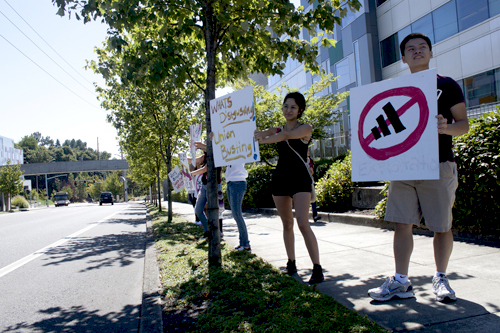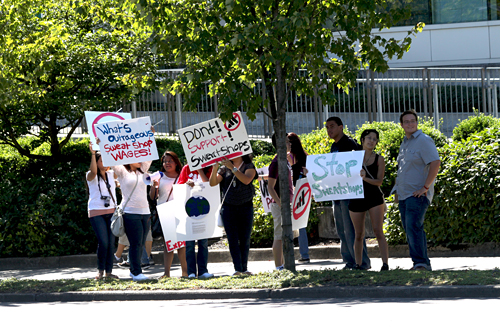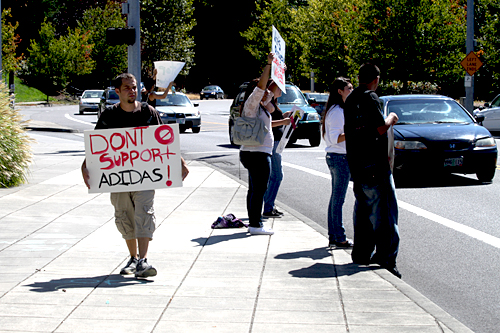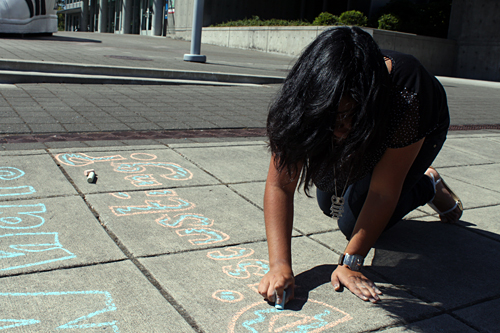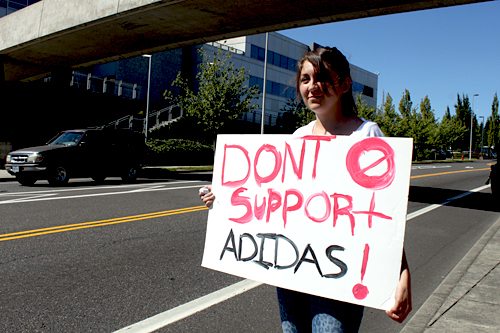On September Fourth at around noon, protesters marched onto the Adidas North America campus on Greeley Avenue in North Portland in protest of what they described as “union-busting” tactics and “unfair sweat shop wages” overseas in addition to the alleged denial of 1.8 million dollars in severance pay to Indonesian workers. Though conflict between the Adidas staff on site and protesters was minimal, Adidas security staff watched the activists from the edge of the campus as the demonstrators marched up and down the sidewalks, chanting and bearing signs painted with anti-Adidas messages. The protesters were declined entry to the interior of the complex and as such, could not deliver a letter that they had written for those in charge of the campus on the grounds that they should have requested an appointment ahead of time. As such, the demonstration took place mainly on the sidewalks that lined the avenue running through the heart of the campus.
At the beginning of the protest, activists stayed beneath the shade of some trees, holding their signs aloft for passing cars to see.
As time passed, they grouped more closely together and used a megaphone to ensure that their message was heard.
Later, the protesters moved down the street and spread to both sides of the street. Signs like these denounced Adidas’s alleged “sweat shop wages” and “union-busting” tactics.
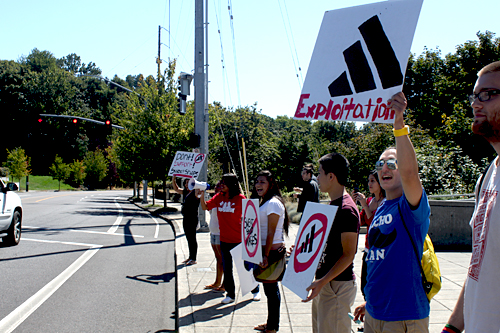
Across the street, the demonstrators’ chants echoed the messages of their signs while decrying their lack of access to the interior of the building. Chants were simple and included such verses as “What’s disgusting? Union busting!” as well as “Nothing to hide? Let us inside!”
A few passing cars honked their horns in support of the protesters’ activities and messages.
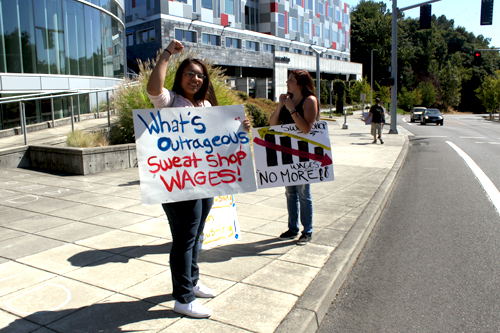
One protestor raised her fist in objection to Adidas’s policies.
It did not take long for the activists to write their messages in chalk along the sidewalk in order to increase their visibility. This message in particular was an echo of the protesters’ claims of Adidas’s failure to give Indonesian workers 1.8 million dollars in severance pay.
Yanely Rivas, a student at the University of Oregon majoring in ethnic studies and public planning and management was among those who used chalk as a medium of protest.
In perhaps twenty minutes, both sides of N Greeley Avenue were covered in the demonstrators’ messages.
At one point, the protesters turned their attention to the inside of the campus, using their megaphone to amplify their message to the Adidas employees within.
Linda Pelago, an international studies major at Lane Community College in Eugene, Oregon continued to urge Portland citizens in passing cars to not support Adidas.
Just before the end of the protest, activists gathered around the massive shoe statues of the Adidas campus. They raised their cell phones, suggesting that Adidas leadership should “give [them] a call.”
By 2:35 PM, the protesters had vacated the area. Adidas staff hastened to wash away the chalk writing that the protesters had left behind using a hose, but declined to comment and did not wish to be photographed. Within little time at all, there was no trace that the protest had even happened.
While Adidas employees on site did not wish to comment on the protest, Adidas America spokesperson, Lauren Lamkin, did have a few things to say in response to the demonstrators’ allegations. In regard to the claims of sweatshop wages overseas, Lamkin stated that Adidas has taken “an active role to promote and enforce workplace standards based on International Labor Organization’s core labor rights conventions, which protect and improve worker experiences” and insisted that the company maintained a great degree of “overall transparency.”
In particular, Lamkin insisted that the protesters claims of Adidas’s failure to provide severance pay to workers in Indonesia were fallacious. She maintained that the “factory was closed and abandoned by its owner, not by the adidas Group,” claimed that “adidas was not sourcing products from PT Kizone when it went bankrupt” and ultimately stated that Adidas had “honored all terms of [its] contract, and in turn … cannot assume or accept the liability for the severance owed by the former factory owner.”
While the protesters might not have agreed with such a statement, it is certain that the employees of the German sports apparel manufacturer see no foul play on behalf of their organization.


